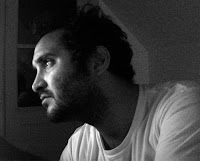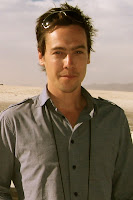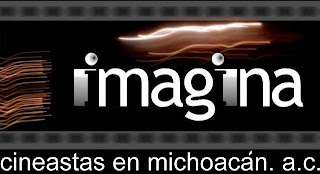- Stephany Mazon (Morelia, Michoacán)
- Juan Carlos Oñate (Morelia, Michoacán)
- Lucero Alejandra Gutiérrez Delgado (Patzcuaro, Michoacán)
Sunday, July 25, 2010
Los Participantes para el Taller de Guión/Screenwriting Workshop Participants
Saturday, July 24, 2010
Michoacán Emerging Filmmakers Initiative/Cineastas Emergentes de Michoacán
Thursday, July 1, 2010
Screenwriter's Workshop Update
El día de ayer 30 de junio se cerró oficialmente la recepción de proyectos para participar en el taller de guión cinematográfico Cine Qua Non Lab 2010.
La extraordinaria respuesta a la convocatoria por parte de cineastas y autoridades e instituciones ha sido sorprendente, y estamos sinceramente agradecidos con todos los participantes.
La calidad y diversidad de los proyectos presentados hará sin duda muy difícil la tarea del comité de selección.
Los proyectos seleccionados serán publicados oficialmente en esta página el día 15 de Julio.
¡buena suerte a todos!
Monday, May 31, 2010
Screenwriter's Workshop 2010

August 13 – 23, 2010
Michoacán, Mexico
Cine Qua Non Lab is pleased to announce the launch of the Screenwriter’s Workshop for filmmakers.
Funding for this year's workshop is provided by the Universidad Michoacana and Villa D'Aqua.
ABOUT CINE QUA NON LAB
Cine Qua Non Lab's mission is to provide a space for Mexican and international filmmakers to envision and develop their work, and to bring them together to exchange ideas, share perspectives, and find new opportunities for collaboration. We are located in the small village of Tzintzuntzan in the north of Michoacán state, 35km from the capital of Morelia, and encompass a property that sits on the northwest shore of Lake Patzcuaro, surrounded by the beauty of the Sierra Madre Mountains.
SCREENWRITER'S WORKSHOP 2010:
The Screenwriter’s Workshop is a ten-day workshop that gives independent screenwriters an opportunity to work on their short and feature length narrative scripts in a supportive environment. The workshop is structured to give participants a balance of feedback through workshop sessions, as well as time to work individually.
This summer, the workshop will be held from Friday, August 13 to Monday, August 23nd. Eight to ten filmmakers will be selected to participate. Applications will be accepted in English or Spanish. However, all participants will need a fluent command of the English language, as the workshop will be held in English, and scripts must be read & translated into English for all workshop sessions.
Applications will be accepted for feature film scripts that are ready for the revision process; feature film treatments that are ready to be turned into pages; and short films that will be revised or written at the residency.
Workshop Sessions
Over the course of the workshop, each participant will have several opportunities to present their work for feedback from an experienced facilitator and other workshop participants. The workshop session will be held for 3 hours in the morning, and up to three participants will present their work during the session. All participants are required to attend all the workshops and to read all the material being presented.
One-on-One
On days when workshops are not in session, participants have the opportunity to schedule one-on-one time with the facilitator. This gives each participant an opportunity to work through additional story and structure questions at their discretion, to follow-up with the facilitator on issues that may have come up during the workshop session, and to bring new ideas to the table. One-on-one sessions are not required, but scheduled according to each participant’s needs.
Independent Time
Participants will have ample independent time outside of the workshop sessions. Participants can structure this time however they feel best fits their creative process.
Residency Support
Cine Qua Non Lab will provide accommodations and meals throughout the residency, in addition to the extensive creative support through the Screenwriter’s Workshop. All participants are responsible for their own travel expenses to and from the residency, but some local transportation services may be provided from the residency to the surrounding areas.
Meals will be available at specific times, with dinner being a meal participants are required to eat together, in order to promote a spirit of collaboration and the exchange of ideas and sharing of perspectives. Snacks will also be available in the kitchen throughout the day.
Each participant will have their own room in a group house consisting of two to three participants. Each house will have a common living area, kitchen, and bathroom.
Throughout the residency grounds, participants will find ample space to work. Participants are welcome to work in their own resident houses which will be equipped with desks and chairs, or find a space in the main lake house or outside along the lake and patio.
Printers and internet are available in the main lake house. However, access to internet is limited, and available only for very short periods of time, due to the remoteness of the location. Should participants need a longer period of internet access, there is a small internet café about a fifteen minute ride from the residency grounds. Scripts will be shared using data (memory) sticks. Participants must provide their own laptop.
Workshop Schedule
The schedule has been created in order to give participants the maximum support and flexibility each day. The schedule alternates between a workshop day and a non-workshop day, with meals available at regular times throughout the day.
Workshop Days
8am – 9:30am Breakfast
10am – 1:00pm Workshop (together)
1:30pm – 2:30pm Lunch
7:00 – 8:30pm Dinner (together)
Non-Workshop Days
8am – 9:30am Breakfast
1:30pm – 2:30pm Lunch
7:00 – 8:30pm Dinner (together)
Facilitator Bio
Each Screenwriter’s Workshop is facilitated by a professional who has an excellent track record as both a screenwriter and a teacher of screenwriting. This summer’s workshop will be facilitated by Christina Lazaridi, who was nominated for an Academy Award® for her screenplay of “One Day Crossing." The film premiered at the Museum of Modern Art as part of the “New Directors, New Films” series. Lazaridi is based in New York and currently teaches screenwriting at Columbia University’s Graduate Film Division and Princeton University and works as a Story Editor and Screenwriting Consultant in New York, Europe and Los Angeles.She has taught Screenwriting Seminars at Gotham Writer’s Workshops, UCLA Extension Program, Emerson College Loyola Marymount University, Augsburg College and the Southhampton’s Screenplay Conference, has worked in the United Arab Emirates as a Mentor for their Screenwriting Program, “The Circle” and has recently joined the Mediterranean Film Institute (European Union’s Development Program) as one of their Screenwriting Mentors.
TO APPLY
Timeline
Application Announced: June 1
Application Deadline: June 30
Residency Notification of Acceptance: July 9
Participant Confirmation of Acceptance: July 14
Residency Dates: August 13 - 23
Please submit all of the following materials by June 30, 2010.
Application -- Please include 1-2 pages answering the following questions: 1) Your name & contact information (email, phone, address); 2) The title of your project; 3) The type of project you are applying with (Feature -- to be revised at the residency; Short -- writing or revising a script; Feature Film Treatment -- development and writing of new pages); 4) Please tell us a bit about yourself and why you are applying for the Screenwriter's Workshop at this time -- 250 words; 5) How do you envision the realization of your script? For example, "I plan on shooting this for $25,000 with unknown actors in a one-bedroom apartment in New York City that I am borrowing from a friend" or "I'm just the writer, I don't have a director or producer attached yet, but in an ideal world I would like a director like __ to direct this film because..." or "I am planning on directing this script myself next year, and currently have a producer attached, and we are in the midst of raising the $__ budget from various sources that include investors..."
Synopsis of the Project – submit a one page synopsis of the project.
Resume/CV – includes school and professional experience.
Writing Sample – any 15 pages from the script you are applying with or a previous script written solely by the applicant.
All materials should be received by June 30 at cinequanonlab@gmail.com. In the subject line of your email, please state "Application for Workshop/Your Name." Please do not send any additional materials other than what is requested.
WHO IS ELIGIBLE?
Mexican and international filmmakers at any stage of their career, from emerging to established, including graduate (but not undergraduate) students.
GIVING BACK TO CINE QUA NON LAB
Participants are asked to give official recognition to the residency in the future production of their work. This would include an acknowledgement in screen credits or any published rendition of the script.
Participants will also be asked to provide some information and feedback for use in promoting the residency to other filmmakers and funders in the future. This could include photographs of the participants at the workshop, an image from the film, or written comments describing the workshop experience. Materials will only be used with the consent of the participants.
Sarita Khurana, Coordinator (in English)
Lucila Moctezuma, Coordinator (en Español)
Jesus Pimentel Melo, FONCA grantee & Coordinator (en Español)
Friday, May 28, 2010
Taller de Guión Cinematográfico 2010

13 a 23 de agosto de 2010
Tzintzuntzan, Michoacán, MEXICO
Cine Qua Non Lab se complace en anunciar la convocatoria del taller de guión cinematográfico para cineastas 2010.
El taller de 2010 se llevará a cabo gracias a la generosa aportación de fondos por la Universidad Michoacana y Villa D'Aqua.
El taller de 2010 estará dedicado específicamente a proyectos narrativos. Se aceptarán solicitudes para alguna de las siguientes categorías: guiones de largometrajes que ya estén en su fase de revisión; líneas argumentales para largometrajes que necesiten ser desarrolladas; y cortometrajes que serán desarrollados durante el taller.
En el transcurso del taller, los participantes tendrán de 2 a 3 oportunidades de presentar su trabajo para recibir retroalimentación de una Coordinadora Académica con experiencia y de los demás participantes en el taller. Cada cineasta tendrá así la oportunidad de debatir sobre su trabajo en las etapas cruciales del proceso de elaboración del guión, ya sea para desarrollar la narrativa, construir los personajes o reescribir partes del guión. Para algunos participantes puede ser el momento decisivo para avanzar en su trabajo. La Coordinadora Académica del taller dirigirá las sesiones de trabajo en grupo para que respondan a las necesidades específicas de quien exponga su trabajo en ese momento y para que, al mismo tiempo, pueda beneficiar a todos los participantes.
Las sesiones constarán de 3 horas por la mañana, y en cada una de ellas presentarán su trabajo un máximo de 3 personas. Todos los participantes recibirán con antelación los guiones que se vayan a presentar en cada sesión con la finalidad de que tengan tiempo suficiente para leer el material. Los participantes están obligados a asistir a todas las sesiones de trabajo y leer todo el material que se presente.
Aquellos días en que no haya sesiones de trabajo en grupo, los participantes tendrán la oportunidad de programar citas de trabajo personalizadas con la Coordinadora Académica del taller. Esto dará a cada participante la oportunidad de trabajar exhaustivamente en la estructura narrativa, hacer un seguimiento con la Coordinadora Académica de las cuestiones que hayan podido surgir en las sesiones en grupo y debatir nuevas ideas. Las sesiones de trabajo personalizadas no son obligatorias y se programarán según las necesidades de cada participante.
Los participantes tendrán suficiente tiempo para trabajar por cuenta propia fuera de las sesiones de trabajo en grupo y podrán organizar ese tiempo de la manera que mejor convenga a sus procesos creativos.
Cine Qua Non Lab se hará cargo de los gastos de alojamiento y alimentación durante toda la estancia. Los gastos por concepto de viáticos correrán de cargo de cada participante, salvo los viajes locales que se organicen con la finalidad de que los cineastas conozcan los alrededores.
Las comidas se ofrecerán en horarios específicos. Los participantes estarán obligados a cenar todos juntos, con la idea de promover un espíritu de colaboración e intercambio de ideas.
Los participantes se alojarán en grupos de 3 a 4 personas por casa. La mayoría de ellos deberá compartir un cuarto con otra persona. Cada casa tendrá un área de estancia común, cocina y baño.
Los participantes tendrán amplio espacio para trabajar de manera individual, tanto en las casas donde se alojen, que estarán debidamente equipadas, como en las instalaciones de Cine Qua Non Lab.
Habrá impresoras disponibles en las instalaciones de Cine Qua Non Lab. Dado que el acceso a Internet es sumamente limitado, solamente estará disponible por cortos períodos de tiempo y exclusivamente en las instalaciones de Cine Qua Non Lab. En caso de que algún participante requiera de mayor tiempo de conexión a Internet, podrá hacerlo en el vecino poblado de Tzintzuntzan, donde hay cafés con acceso a Internet. Los guiones se distribuirán mediante tarjetas USB que cada participante deberá llevar. También se espera que cada participante traiga consigo su propia computadora portátil.
El programa de trabajo se ha estructurado de tal manera que los participantes dispongan del máximo apoyo y flexibilidad. Se alternarán los días de sesiones de trabajo en grupo con los días dedicados a tiempo personal, y las comidas estarán disponibles en los horarios programados. Los participantes podrán tomar el desayuno y la comida por su cuenta o con el resto del grupo en el área común designada para la comida. Los participantes podrán dedicar tiempo a visitar las zonas aledañas de Tarerio, Tzintzuntzan, Pátzcuaro, Quiroga o incluso ir a pasar el día a la ciudad de Morelia. Todo ello en función de las necesidad de cada participante para su proceso creativo.
8am – 9:30am Desayuno
10am – 1:00pm Sesión de trabajo en grupo
1:30pm – 2:30pm Comida
7:00 – 8:30pm Cena (en grupo)
1:30pm – 2:30pm Comida
7:00 – 8:30pm Cena (en grupo)
PROCESO DE SELECCIÓN DE PARTICIPANTES
Publicación de la convocatoria: 1º de junio
Plazo de postulación: 30 de junio
Notificación de admisión: 9 de julio
Aceptación de los participantes: 14 de julio
Desarrollo del taller: 13 a 23 de agosto
- Nombre y datos de contacto (correo electrónico, teléfono, dirección postal)
- Título del proyecto;
- Tipo de proyecto (revisión de guión de largometraje; escritura o revisión de guión de cortometraje; desarrollo de línea argumental para largometraje);
- Motivaciones para solicitar la admisión al taller (máximo de 250 palabras);
- Finalidad con la que se desarrolla el proyecto (por ejemplo: “Tengo pensado producir este guión con 25,000 dólares con actores desconocidos en un departamento prestado en la ciudad de Nueva York”; “Sólo soy escritor; aún no tengo director ni productor adjunto, pero idealmente me gustaría que un director como… dirigiera esta película porque….”; “Estoy pensando en dirigir este guión el próximo año; ya tengo un productor adjunto y estamos recaudando fondos para su realización”, etc.)
También se pedirá a los participantes que proporcionen material y comentarios para promocionar el taller, como por ejemplo fotos tomadas durante el taller o imágenes de la película basada en el guión desarrollado durante su estancia y comentarios escritos describiendo su estadía y experiencia en Cine Qua Non Lab. Estos materiales sólo se utilizarán con el consentimiento de los participantes.
- Sarita Khurana, Coordinadora (in English)
- Lucila Moctezuma, Coordinadora (en español)
- Jesús Pimentel Melo, FONCA-AEE grantee, Coordinador (en español).


















.jpg)

